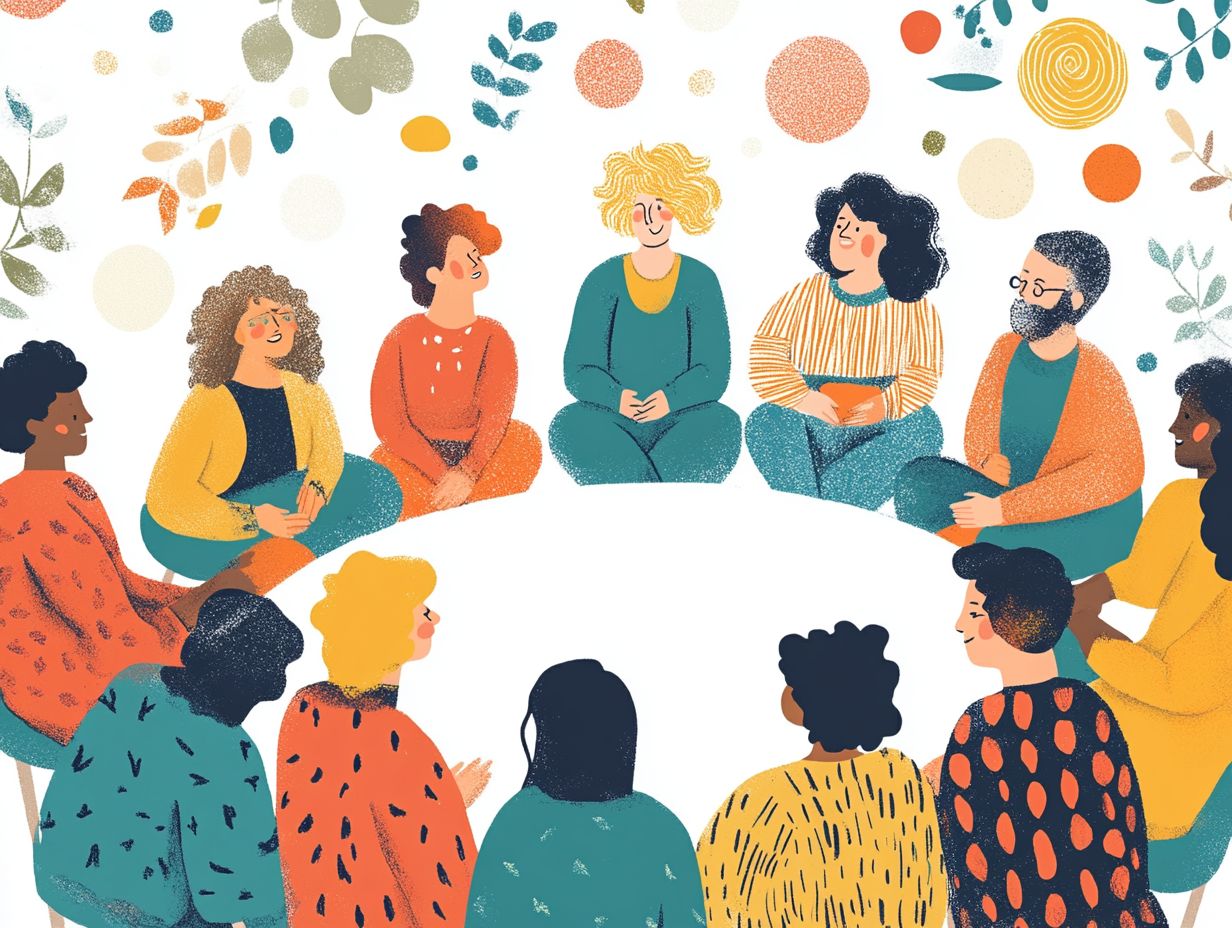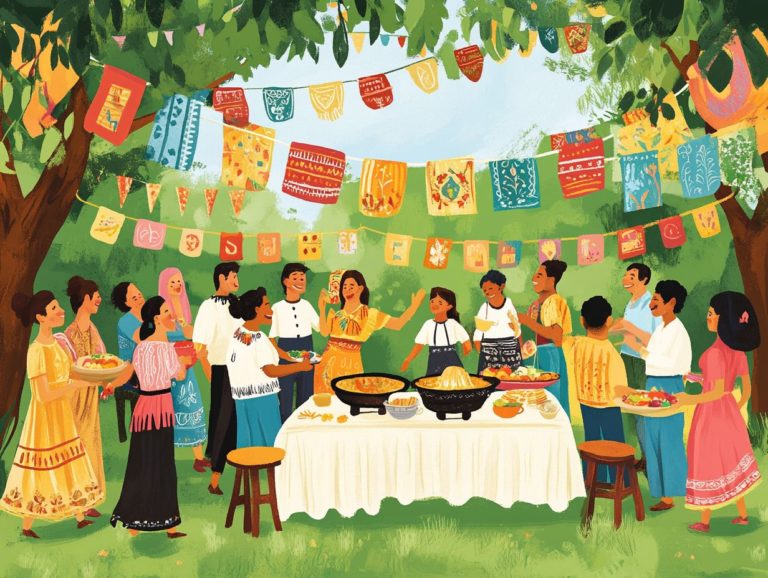What to Expect: The Stages of Cultural Adjustment
Cultural adjustment is a journey you embark on when you encounter new environments, whether through travel, relocation, or immersion in different communities. Understanding the stages of this process can make your transition smoother and enhance your experience.
From the initial thrill of the honeymoon phase to the challenges of resistance, and eventually discovering a true sense of belonging, each stage presents its own unique obstacles and triumphs. This article delves into the four stages of cultural adjustment, exploring common challenges and offering effective coping strategies to help you navigate this transformative experience.
You ll uncover valuable tips and insights designed to enrich your cultural journey!
Contents
Key Takeaways:

- Cultural adjustment is the process of adapting to a new culture, which is important for successful integration into a new environment.
- The four stages of cultural adjustment, including the honeymoon, resistance, adjustment, and adaptation stages, can be challenging but can also lead to personal growth and understanding of different cultures.
- To effectively cope with challenges at each stage, it is important to be open-minded, communicate with others, and seek support from programs that help you understand the culture better.
Understanding Cultural Adjustment
Understanding cultural adjustment is a vital journey for you as an international student or a first-time expat stepping into unfamiliar territory. This phase is often accompanied by a significant experience of culture shock, where you ll get used to local customs and societal norms in your new environment.
Successfully navigating this cultural adjustment is essential for your personal growth. It enables you to integrate into your host country while fostering meaningful relationships with diverse cultures.
Definition and Importance
Cultural adjustment is the process through which you adapt to a new cultural environment. This journey is especially crucial for international students grappling with culture shock upon arriving in a foreign land.
This transition can feel overwhelming. You ll need to get used to unfamiliar social norms and daily routines. Many international students face emotional and psychological challenges during this period, including homesickness and anxiety sparked by language barriers. The initial thrill of studying abroad can swiftly give way to feelings of isolation or frustration, particularly when effective communication becomes a struggle or the comforts of home seem distant.
Overcoming these hurdles presents a vital opportunity for personal growth. It encourages resilience, fosters adaptability, and enhances your understanding of different cultures, ultimately leading to a richer and more rewarding educational experience.
The Four Stages of Cultural Adjustment
The journey of cultural adjustment often unfolds in four distinct stages: the Honeymoon Stage, Frustration Stage, Adjustment Stage, and Adaptation Stage.
Each stage is marked by unique emotional responses to the challenges of culture shock, guiding you through the complexities of navigating a new environment.
Honeymoon Stage
The Honeymoon Stage is the exciting beginning of cultural adjustment. You find yourself enveloped in fascination as you explore new environments and diverse cultures.
During this exhilarating time, you might be captivated by the vibrant local festivals, indulging in culinary delights that are unfamiliar yet tantalizing, or marveling at breathtaking landscapes that leave you in awe. The thrill of uncovering hidden gems in bustling markets or immersing yourself in the unique traditions of a lively community ignites your sense of adventure.
However, this stage can also introduce an element of culture shock. You may navigate unexpected social norms or grapple with language barriers. Yet, the overwhelming sense of wonder and novelty usually outweighs these challenges, creating vivid memories of exploration that set the stage for a deeper understanding and integration into your new surroundings.
What has been your biggest challenge in adapting to a new culture? Dive in and start your adventure today!
Resistance Stage

The Resistance Stage, often called the Frustration Stage, sets in when the initial thrill of your new adventure starts to wear off. You may grapple with anger, frustration, and confusion, all thanks to culture shock and language barriers.
Homesickness can creep in as you miss the comforting routines and familiarities of your home culture. Adapting to local customs might feel like trying to solve a riddle alien or even illogical which heightens feelings of disconnection.
Your emotional responses can swing widely. Moments of anger or unexpected sadness can become part of your daily life as you navigate the challenges of living in a foreign environment.
To cope, forge connections with others in similar situations. Seeking support from local communities or creating your own rituals that blend both cultures can provide a sense of stability.
By acknowledging these emotions and implementing effective strategies, you can gradually move beyond the discomfort and start to truly embrace your new surroundings.
Adjustment Stage
The Adjustment Stage is characterized by a gradual acceptance of the new culture. You start to share cultures and adopt elements of the local way of life.
You begin forming connections with local residents. Participating in community events and conversations unveils the richness of your new surroundings.
By immersing yourself in local traditions and values, you broaden your perspectives and cultivate meaningful relationships. Embracing cultural differences is paramount as it paves the way for mutual respect and understanding.
Shared experiences and open-minded interactions help you enhance your sense of belonging and navigate this transitional phase with greater ease.
Adaptation Stage
The Adaptation Stage represents the final phase of cultural adjustment, where you feel truly comfortable and skilled at navigating your new cultural environment. This highlights your significant personal growth.
During this phase, you don t just accept local customs; you seamlessly weave them into your daily routine. This cultivates a genuine sense of belonging.
As you immerse yourself in the community, you forge friendships that transcend cultural differences. This deepens your understanding and appreciation of your new surroundings.
Participating in annual festivals or celebrating local holidays can ignite a profound connection to the culture, allowing you to thrive and feel integrated. Mastering local practices boosts your confidence and opens doors to both personal and professional opportunities, enriching your life experiences.
Challenges and Coping Strategies for Each Stage
Cultural adjustment brings a range of challenges at every stage. These range from homesickness and language barriers to the emotional strain of adapting to a new environment. It s essential to develop effective coping strategies to navigate these complexities successfully.
Common Challenges Faced
During cultural adjustment, common challenges may include homesickness, language barriers, and frustration from misunderstandings. You may also struggle to integrate into local communities.
These obstacles can create a sense of isolation as you navigate the anxiety of being in an unfamiliar environment. A simple mix-up during social interactions can quickly escalate into feelings of embarrassment or confusion.
Your longing for familiar surroundings may intensify personal struggles, leading to feelings of sadness or loneliness. Recognizing these challenges gives both you and your support systems the power to address emotional well-being effectively.
This guides you toward adaptation and fosters resilience in your new cultural landscape.
Effective Coping Strategies

Effective coping strategies for cultural adjustment include honing your language skills, actively socializing, and seeking support from fellow expats or local communities.
These tools enhance your communication and foster connections that alleviate feelings of isolation often encountered during transitions. Dive into local customs and traditions, participate in community events, and establish a routine that beautifully blends familiar and new activities.
Maintaining an open mindset is incredibly beneficial. It paves the way for personal growth and adaptability. Building a network of supportive relationships is vital for navigating challenges and finding encouragement in shared experiences.
Ultimately, these strategies underscore the vital connection between community support and individual resilience during the adjustment period.
Tips for Successful Cultural Adjustment
To achieve successful cultural adjustment, you should actively engage in socializing and fully embrace the cultural differences around you. Cultivating an understanding of local customs will significantly enhance your experiences, allowing you to navigate your new environment with confidence and grace.
Preparing for the Adjustment Process
Preparing for the adjustment process requires setting realistic expectations, acquiring essential language skills, and familiarizing yourself with local customs to ease your transition.
To elevate your preparation, consider seeking out resources like cultural orientation programs, online forums, or local community groups that offer valuable insights and support. Engaging with expatriates who have successfully navigated similar experiences can provide you with invaluable perspectives and practical tips.
Taking the time to research the country s social norms, etiquette, and even common phrases can significantly diminish the effects of culture shock. Actively participating in workshops or classes focused on local traditions and practices will lead to a deeper understanding, facilitating smoother interactions in your new environment.
This ultimately leads to a more enjoyable experience.
Embracing Cultural Differences
Embracing cultural differences is crucial for personal growth and successful cultural exchange. It allows you to deepen your understanding of local customs and the broader community.
Engaging with diverse perspectives cultivates a sense of empathy that bridges gaps between varying worldviews. For instance, when you participate in local festivals like Diwali or Lunar New Year, you gain insight into rich traditions and values that may differ from your own.
These experiences foster mutual respect, as you learn to celebrate your heritage while appreciating the stories and practices of others. Such interactions can challenge preconceived notions and inspire personal transformation, contributing to a more inclusive society that values its vibrant mosaic of cultures.
Frequently Asked Questions
What are the stages of cultural adjustment?

The stages of cultural adjustment include the honeymoon phase, frustration phase, adjustment phase, and acceptance phase.
How long does each stage of cultural adjustment typically last?
The length of each stage can vary. The honeymoon phase usually lasts a few weeks, while the frustration phase can last a few months. The adjustment and acceptance phases can last up to a year or more.
What can I expect to feel during the honeymoon phase?
During the honeymoon phase, you may feel excited, curious, and eager to explore and learn about the new culture. You might also experience a sense of novelty and fascination.
What are common challenges during the frustration phase?
Common challenges during the frustration phase include feeling homesick, experiencing culture shock, and struggling to adapt to new customs, language, and social norms.
Connect with local communities to share your experiences and enrich your journey.
How can I make the adjustment phase easier?
To ease the adjustment phase, keep a positive attitude and stay open-minded.
You should also seek support from other expats or locals who have faced similar challenges.
What does the acceptance phase mean?
The acceptance phase means you have adapted to your new culture and integrated it into your life.
While challenges may still arise, you now have coping strategies and feel comfortable in your environment.





